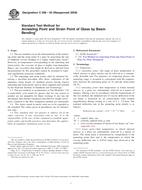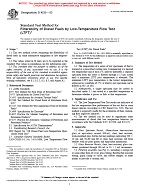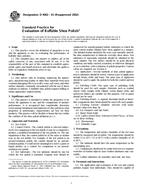1.1 These test methods are suitable for testing the integrity of unitized loads and large cases and crates, but not individual drums or palletized drums, as well as the ability of the contents to endure normal handling, using standard mechanical handling equipment. Not all of the test methods are applicable to all products containers and loads. These test methods are applicable to common means of material handling, including pull pack, clamp truck, and spade lift-type handling equipment as follows:
1.1.1 Test Method A – Fork Truck Handling – For testing the ability of the shipping unit to withstand repeated handlings by this test method.
1.1.2 Test Method B – Spade Lift Test – For lifting by spade lift attachment to determine the ability of the handling flap of the case or shipping unit to withstand repeated lifting and handling by this test method.
1.1.3 Test Method C – Clamp Handling Test – For lifting by hydraulic clamp attachment, to determine the ability of the shipping unit to withstand squeeze clamp handling consisting of repeated side compression and lifting.
1.1.4 Test Method D – Push-Pull Handling Test – For testing the ability of a unitized load on a slip-sheet to withstand repeated handling by this test method.
1.1.5 Test Method E – Grabhook Test – For lifting by grabhooks to determine the ability of the shipping unit to withstand the horizontal pressures of grabhooks.
1.1.6 Test Method F – Sling Tests – For lifting by wire rope, cable, or woven fiber slings to determine the ability of the shipping unit to withstand the compression of slings.
1.2 Additional Test Methods:
1.2.1 Additional test methods that apply to mechanical handling and rough handling tests of unitized loads and large cases and crates include incline impact tests, described in Test Method D 880; horizontal impact tests, described in Test Method D 4003.
1.2.2 Practice D 4169 provides a series of options for selecting and running performance tests on all types of shipping containers and systems.
1.3 This standard does not purport to address all of the safety concerns, if any, associated with its use. It is the responsibility of the user of this standard to establish appropriate safety and health practices and determine the applicability of regulatory limitations prior to use.
Product Details
- Published:
- 04/01/2007
- Number of Pages:
- 6
- File Size:
- 1 file , 84 KB


